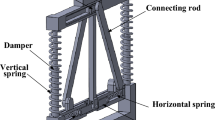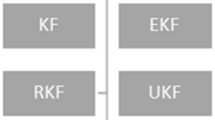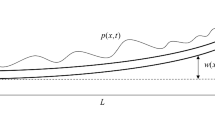Abstract
This paper is concerned with the problem of mode dependent H∞ filter for uncertainty Markovian jump system with neutral delay and retarded time-varying delay. By using free weight matrix (FWM) technique, the stability conditions of delay dependent are obtained under the framework of Lyapunov stability theory. Based on those result, the delay dependent conditions for full order and mode dependent Markovian jump linear filters are gained, which are expressed by Linear matrix inequalities (LMIs). Finally, a numerical example and a PEEC practical example are employed to prove the validity of the results.
Similar content being viewed by others
References
S. Xu, J. Lam, and X. Mao, “Delay-dependent H∞ control and filtering for uncertain Markovian jump systems with time-varying delays,” IEEE Transactions on Circuits and Systems I: Regular Papers, vol. 54, no. 9, pp. 2070–2077, 2007.
B. Zhang, W. X. Zheng, and S. Xu, “On robust H∞ filtering of uncertain Markovian jump time-delay systems,” International Journal of Adaptive Control and Signal Processing, vol. 26, no. 2, pp. 138–157, 2011.
J. Cheng, J. H. Park, J. Cao, and W. Qi, “A hidden mode observation approach to finite-time SOFC of Markovian switching systems with quantization,” Nonlinear Dynamics, vol. 100, pp. 509–521, 2020.
G. Zhuang, Q. Ma, B. Zhang, S. Xu, and J. Xia, “Admissibility and stabilization of stochastic singular Markovian jump systems with time-delays,” System & Control Letters, vol. 114, pp. 1–10, 2018.
Y. Zhu, X. Song, M. Wang, and J. Lu, “Finite-time asynchronous H∞ filtering design of Markovian jump systems with randomly occurred quantization,” International Journal of Control, Automation, and Systems, vol. 18, no. 2, pp. 450–461, 2020.
R. Kavikumar, R. Sakthivel, O. M. Kwon, and B. Kaviarasan, “Reliable non-fragile memory state feedback controller design for fuzzy Markov jump systems,” Nonlinear Analysis: Hybrid Systems, vol. 35, p. 100828, 2020.
G. Zhuang, J. Xia, J. Feng, W. Sun, and B. Zhang, “Admissibilization for implicit jump systems with mixed retarded delays based on reciprocally convex integral inequality and Barbalat’s lemma,” IEEE Transactions on Systems, Man, and Cybernetics, 2020. DOI: https://doi.org/10.1109/TSMC.2020.2964057
Z. Wu, P. Shi, Z. Shu, H. Su, and R. Lu, “Passivity-based asynchronous control for Markov jump systems,” IEEE Transactions on Automatic Control, vol. 62, no. 4, pp. 2020–2025, 2017.
S. Zhu, Q. L. Han, and C. Zhang, “L1-stochastic stability and L1-gain performance of positive Markov jump linear systems with time-delays: necessary and sufficient conditions,” IEEE Transactions on Automatic Control, vol. 62, no. 7, pp. 3634–3639, 2017.
H. Ren, G. Zong, and H. R. Karimi, “Asynchronous finite-time filtering of Markov jump nonlinear systems and its applications,” IEEE Transactions on Systems, Man, and Cybernetics: Systems, 2019. DOI: https://doi.org/10.1109/TSMC.2019.2899733
H. Shen, Y. Wang, J. Xia, J. H. Park, and Z. Wang, “Fault-tolerant leader-following consensus for multi-agent systems subject to semi-Markov switching topologies: An event-triggered control scheme,” Nonlinear Analysis: Hybrid Systems, vol. 34, pp. 92–107, 2019.
H. Shang, W. H. Qi, and G. D. Zong, “Asynchronous H∞ control for positive discrete-time markovian jump systems,” International Journal of Control, Automation, and Systems, vol. 18, no. 2, pp. 431–438, 2020.
H. Gao, J. Xia, and G. Zhuang, “Robust finite-time extended dissipative control for a class of uncertain switched delay systems,” International Journal of Control, Automation and Systems, vol. 16, no. 3, pp. 1459–1468, 2018.
J. Xia, G. Chen, J. H. Park, Hao Shen, and G. Zhuang, “Dissipativity-based sampled-data control for fuzzy switched Markovian jump systems,” IEEE Transactions on Fuzzy Systesms, 2020. DOI: https://doi.org/10.1109/TFUZZ.2020.2970856
J. Cheng, J. H. Park, X. Zhao, H. R. Karimi, and J. Cao, “Quantized nonstationary filtering of network-based Markov switching RSNSs: a multiple hierarchical structure strategy,” IEEE Transactions on Automatic Control, vol. 65, no. 11, pp. 4816–4823, 2020.
Z. H. Xu, H. J. Ni, H. R. Karimi, and D. Zhang, “A Markovian jump system approach to consensus of heterogeneous multi-agent systems with partially unknown and uncertain attack strategies,” International Journal or Robust and Nonlinear Control, vol. 30, pp. 3039–3053, 2020.
J. Zhang, M. Li, and Raissi, T, “Reliable actuator fault control of positive switched systems with double switchings,” Asian Journal of Contral, 2020. DOI: https://doi.org/10.1002/asjc.2338
J. Zhang and T. Raissi, “Saturation control of switched nonlinear systems,” Nonlinear Analysis: Hybird Systems, vol. 32, pp. 320–336, 2019.
L. Liu, J. Zhang, Y. Shao, and X. Deng, “Event-triggered control of positive switched systems based on linear programming,” IET Contral Theory and Applications, vol. 14, no. 1, pp. 145–155, 2019.
D. Zhao, H. R. Karimi, R. Sakthivel, and Y. Li, “Nonfragile fault-tolerant control for nonlinear Markovian jump systems with intermittent actuator fault,” Nonlinear Analysis: Hybrid Systems, vol. 32, pp. 337–350, 2019.
B. Jiang, H. R. Karimi, S. Yang, C. C. Gao, and Y. Kao, “Observer-based adaptive sliding mode control for nonlinear stochastic Markov jump systems via T-S fuzzy modeling: Applications to robot arm model,” IEEE Transactions on Industrial Electronics, vol. 68, no. 1, pp. 466–477, 2020.
J. Cheng, J. H. Park, H. R. Karimi, and X. Zhao, “Static output feedback control of nonhomogeneous Markovian jump systems with asynchronous time delays,” Information Sciences, vol. 399, pp. 219–238, 2017.
D. Zhang, Y. P. Shen, S. Q. Zhou, X. W. Dong, and L. Yu, “Distributed secure platoon control of connected vehicles subject to DOS attack: theory and application,” IEEE Transactions on Systems, Man, and Cybernetics: Systems, 2020. DOI: https://doi.org/10.1109/TSMC.2020.2968606
G. Chen, J. Xia, and G. Zhuang, “Delay-dependent stability and dissipativity analysis of generalized neural networks with Markovian jump parameters and two delay components,” Journal of the Franklin Institute, vol. 353, no. 9, pp. 2137–2158, 2016.
Q. Zhou, S. Zhao, H. Li, R. Lu, and C. Wu, “Adaptive neural network tracking control for robotic manipulators with dead-zone,” IEEE Transactions on Neural Networks and Learning Systems, vol. 30, no. 12, pp. 3611–3620, 2019.
S. Xu, and J. Lam, “A survey of linear matrix inequality techniques in stability analysis of delay systems,” International Journal of Systems Sciences, vol. 39, no. 12, pp. 1095–1113, 2008.
X. Zhao, and Q. Zeng, “Stabilization of jump linear systems with mode-dependent time varying delays,” Optimal Control Application and Methods, vol. 32, no. 2, pp. 139152, 2011.
Y. Chen, and W. Zheng, “Stability analysis and control for switched stochastic delayed systems,” International Journal of Robust and Nonlinear Control, vol. 26, no. 2, pp. 303–328, 2016.
Y. Liu, J. H. Park, and F. Fang, “Global exponential stability of delayed neural networks based on a new integral inequality,” IEEE Transactions on Systems, Man, and Cybernetics: Systems, vol. 49, no. 11, pp. 2318–2325, 2019.
D. Zhang, Z. H. Xu, G. Feng, and H. Y. Li, “Asynchronous resilient output consensus of switched heterogeneous linear multivehicle systems with communication delay,” IEEE/ASME Transactions on Mechatronics, vol. 24, no. 6, pp: 2627–2640, 2019.
J. Zhou, Y. Liu, J. H. Park, Q. Kong, and Z. Wang, “Fault-tolerant anti-synchronization control for chaotic switched neural networks with time delay and reaction diffusion,” Discrete & Continuous Dynamical Systems-S, vol. 14, no. 4, pp. 1569–1589, 2021.
G. Liu, S. Xu, J. H. Park, and G. Zhuang, “Reliable exponential H∞ filtering for singular Markovian jump systems with time-varying delays and sensor failures,” International Journal of Robust and Nonlinear Control, vol. 28, no. 14, pp. 4230–4245, 2018.
R. Sakthivel, M. Joby, K. Mathiyalagan, and S. Santra, “Mixed H∞ and passive control for singular Markovian jump systems with time delays,” Journal of the Franklin Institute, vol. 352, no. 10, pp. 4446–4466, 2015.
G. Zhuang, S. Xu, B. Zhang, H. Xu, and Y. Chu, “Robust H∞ deconvolution filtering for uncertain singular Markovian jump systems with time-varying delays,” International Journal of Robust and Nonlinear Control, vol. 26, no. 12, pp. 2564–2585, 2016.
B. Zhang, S. Zhou, and S. Xu, “Delay-dependent H∞ controller design for linear neutral systems with discrete and distributed delays,” International Journal of Systems Science, vol. 38, no. 8, pp. 611–621, 2007.
J. H. Park, O. M. Kwon, and S. M. Lee, “LMI optimization on stability for delay neural networks of neutral type,” Applied Mathematics and Computation, vol. 196, no. 1, pp. 236–244, 2008.
S. Xu, J. Lam, and C. Yang, “H∞ and positive-real control for linear neutral delay systems,” IEEE Transactions on Automatic Control, vol. 46, no. 8, pp. 1321–1326, 2001.
D. Yue and Q. Han, “A delay-dependent stability criterion of neutral systems and its application to a partial element equivalent circuit model,” IEEE Transactions on Circults and Systems II: Express Briefs, vol. 51, no. 12, pp. 13211022, 2004.
Q. Han, “On robust stability of neutral systems with time-varying discrete delay and norm-bounded uncertainty,” Automatica, vol. 40, no. 6, pp. 1087–1092, 2004.
J. H. Park, O. M. Kwon, and S. Won, “LMI approach to robust H∞ filtering for neutral delay differential systems,” Applied Mathematics and Computation, vol. 150, no. 1, pp. 235–244, 2004.
M. Wu, Y. He, and J. She, “New delay-dependent stability criteria and stabilizing method for neutral systems,” IEEE Transactions on Automatic Control, vol. 49, no. 12, pp. 2266–2271, 2004.
G. Chen, and Y. Shen, “Robust H∞ filter design for neutral stochastic uncertain systems with time-varying delay,” Journal of Mathematical Analysis and Applications, vol. 353, no. 1, pp. 196–204, 2009.
Y. Chen, W. Qian, and S. Fei, “Improved robust stability conditions for uncertain neutral systems with discrete and distributed delays,” Journal of the Franklin Institute, vol. 352, no. 7, pp. 2634–2645, 2015.
B. Zhang, S. Xu, Q. Ma, and Z. Zhang, “Output-feedback stabilization of singular LPV systems subject to inexact scheduling parameters,” Automatica, vol. 104, pp. 1–7, 2019.
P. Balasubramaniam, A. Manivannan, and R. Rakkiyappan, “Exponential stability results for uncertain neutral systems with interval time-varying delays and Markovian jumping parameters,” Applied Mathematics and Computation, vol. 216, no. 11, pp. 3396–3407, 2010.
L. Xiong, J. Tian, and X. Liu, “Stability analysis for neutral Markovian jump systems with partially unknown transition probabilities,” Journal of the Franklin Institute, vol. 349, pp. 2193–2214, 2012.
G. Zhuang, S. Xu, J. W. Xia, Q. Ma, and Z. Q. Zhang, “Non-fragile delay feedback control for neutral stochastic Markovian jump systems with time-varying delays,” Applied Mathematics and Computation, vol. 355, pp. 21–32, 2019.
Y. Su, M. Chen, B. Chen, and C. Lin, “Fuzzy H∞ filter design for nonlinear discrete-time systems with time-varying delays,” International Journal of Innovative Computing, Information and Control, vol. 6, no. 10, pp. 4335–4346, 2010.
Y. Liu, F. Fang, and J. H. Park, “Decentralized dissipative filtering for delayed nonlinear interconnected systems based on T-S fuzzy model,” IEEE Transactions on Fuzzy Systems, vol. 27, no. 4, pp. 790–801, 2019.
J. Xiong, X. Chang, and X. Yi, “Design of robust nonfragile fault detection filter for uncertain dynamic systems with quantization,” Applied Mathematics and Computation, vol. 338, pp. 774–788, 2018.
W. Sun, Y. Wu, and Z. Sun, “Command filter-based finite-time adaptive fuzzy control for uncertain nonlinear systems with prescribed performance,” IEEE Transactions on Fuzzy Systems, vol. 28, no. 12, pp. 3161–3170, 2020.
J. Xia, B. Li, S-F. Su, W. Sun, and H. Shen, “Finite-time command filtered event-triggered adaptive fuzzy tracking control for stochastic nonlinear systems,” IEEE Transactions on Fuzzy Systems, 2020. DOI: https://doi.org/10.1109/TFUZZ.2020.2985638
J. Xiong and J. Lam, “Fixed-order robust H∞ filter design for Markovian jump systems with uncertain switching probabilities,” IEEE Transactions on Signal Processing, vol. 54, no. 4, pp. 1421–1430, 2006.
X. H. Chang and G. H. Yang, “Nonfragile H∞ filtering of continuous-time fuzzy systems,” IEEE Transactions on Signal Processing, vol. 59, no. 4, pp. 1528–1538, 2011.
W. Sun, S. Su, Y. Wu, and J. Xia, “A novel adaptive fuzzy control for output constrained stochastic non-strict feedback nonlinear systems,” IEEE Transactions on Fuzzy Systems, 2020. DOI: https://doi.org/10.1109/TFUZZ.2020.2969909
X. H. Chang and G. H. Yang, “Nonfragile H∞ filter design for T-S fuzzy systems in standard form,” IEEE Transactions on Industrial Electronics, vol. 61, no. 7, pp. 3448–3458, 2014.
Z. Wu, H. Su, and J. Chu, “H filtering for singular Markovian jump systems with time delay,” International Journal of Robust and Nonlinear Control, vol. 20, pp. 939–957, 2010.
B. Zhang, W. Zheng, and S. Xu, “Filtering of Markovian jump delay systems based on a new performance index,” IEEE Transactions on Circuits and Systems I: Regular Papers, vol. 54, no. 9, pp. 1250–1263, 2013.
Author information
Authors and Affiliations
Corresponding author
Additional information
Publisher’s Note Springer Nature remains neutral with regard to jurisdictional claims in published maps and institutional affiliations.
The authors would like to thank the Editors and the Referees for their valuable comments and suggestions, which helped to greatly improve the work. This work was partially supported by the National Natural Science Foundation of China under Grants 61773191, 61973148; Support Plan for Outstanding Youth Innovation Team in Shandong Higher Education Institutions under Grant 2019KJI010; the Natural Science Foundation of Shandong Province for Outstanding Young Talents in Provincial Universities under Grant ZR2016JL025; the Natural Science Foundation of Shandong Province for Key Projects under Grant ZR2020KA010;Undergraduate Education Reform Project of higher Education in Shandong Province under Grant M2018X047; Liaocheng University Education Reform Project Foundation under Grants G201811, 26322170267.
Guowei Zhao received his B.Sc. degree in mathematics and applied mathematics from Liaocheng University, Liaocheng, China, in 2018. He is currently a graduate student of the School of Mathematical Sciences, Liaocheng University. His current research interests include neutral systems, Markov jump systems, time-delay systems, robust control and filtering.
Guangming Zhuang received his M.Sc. degree in probability and mathematical statistics from Southwest University, Chongqing, China, in 2007 and Ph.D. degree in control theory and control engineering from Nanjing University of Science and Technology in 2016. Since July, 2007, he has been with the School of Mathematical Sciences, Liaocheng University, Liaocheng, China. He is currently an Associate Professor of the School of Mathematical Sciences, Liaocheng University. Dr. Zhuang was a recipient of the Natural Science Foundation of Shandong Province for Outstanding Young Talents in Provincial Universities in the year 2016. He is the Leader of Support Plan for Outstanding Youth Innovation Team in Shandong Higher Education Institutions. His research interests include singular systems, stochastic systems control and filtering.
Jianwei Xia received his Ph.D. degree in automatic control from Nanjing University of Science and Technology in 2007. From 2010 to 2012, he worked as a Postdoctoral Research Associate in the School of Automation, Southeast University, Nanjing, China. From 2013 to 2014, he worked as a Postdoctoral Research Associate in the Department of Electrical Engineering, Yeungnam University, Kyongsan, Korea. He is a Professor of the School of Mathematical Sciences, Liaocheng University. His research topics are robust control, stochastic systems and neural networks.
Wei Sun received his M.Sc. degree in operation research and control theory from Qufu Normal University in 2011 and his Ph.D. degree from the School of Automation, Southeast University in 2014. He was a Postdoctoral Researcher at Department of Electrical Engineering, National Taiwan University of Science and Technology. He is currently an Associate Professor of the School of Mathematical Sciences, Liaocheng University. His research interests cover nonlinear system control, adaptive theory, fuzzy control, and robotics.
Junsheng Zhao received his M.Sc. degree from the School of Mathematics, Qufu Normal University, China, in 2006 and his Ph.D. degree from the School of Automation, Southeast University, China, in 2014. He is currently an Associate Professor of the School of Mathematical Sciences, Liaocheng University. His main interests include learning dynamics in the dynamic systems, nonlinear system and neural networks.
Minsong Zhang received her Ph.D. degree from the School of Automation, Nanjing University of Science and Technology, China, in 2015. She has been with the School of Mathematics and Statistics, Hubei University of Arts and Science, XiangYang, Hubei, China. Her research interests include time-delay systems, robust control, and nonlinear systems.
Rights and permissions
About this article
Cite this article
Zhao, G., Zhuang, G., Xia, J. et al. Mode-dependent H∞ Filtering for Time-varying Delays Neutral Jump Systems Based on FWM Technique. Int. J. Control Autom. Syst. 19, 2092–2104 (2021). https://doi.org/10.1007/s12555-020-0362-4
Received:
Revised:
Accepted:
Published:
Issue Date:
DOI: https://doi.org/10.1007/s12555-020-0362-4




